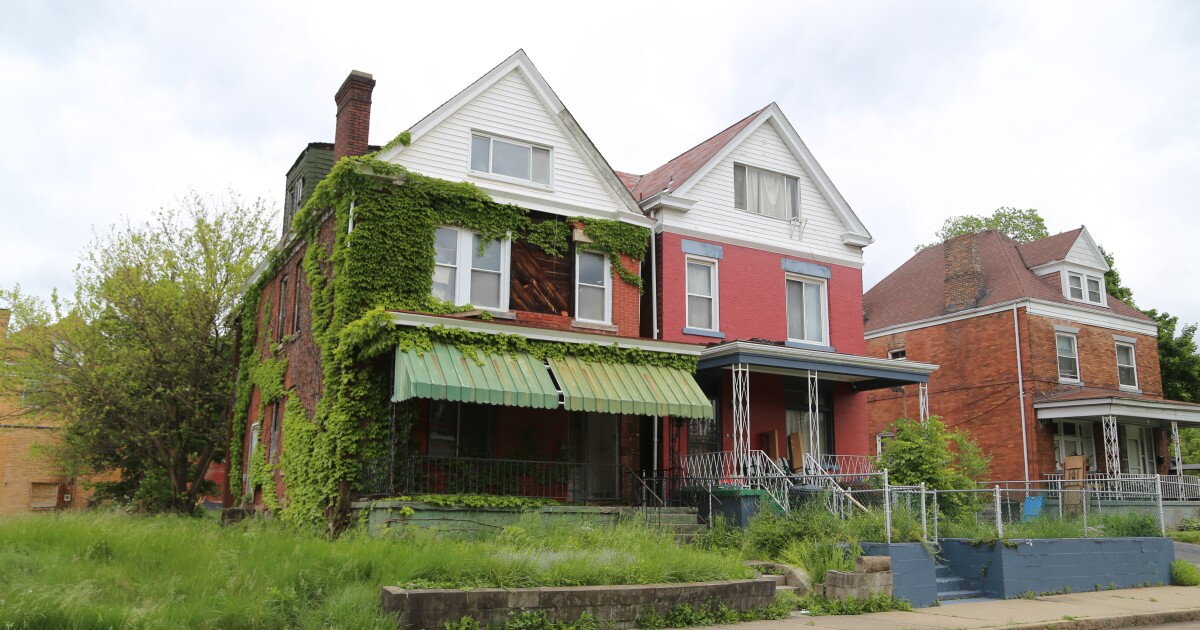A local legislator wants the state to help keep tabs on the owners of blighted properties — and to levy fines against them.
Monroeville Democratic state Rep. Brandon Markosek, who chairs the House committee on Housing and Community Development, has put forth a bill that would create a blight database managed by the state. Municipalities wouldn’t be required to participate, but could opt in.
“Blight affects all communities in Pennsylvania from former coal mining and steel towns to rural communities to our Main Streets in cities and boroughs,” Markosek wrote in a memo to colleagues.
Markosek says the database is a tool to hold negligent owners responsible when their properties become dangerous to neighbors. And being listed there could have consequences.
“There would be some teeth in the bill to help hold people accountable,” he told WESA. “Serious violations that go unresolved for over a year may also be subject to a $1,000 penalty, with proceeds used to help maintain the database.”
The penalty would be levied by the municipality itself, rather than the state Department of Community and Economic Development, which the bill says would operate the program.
Proceeds from the fine would go to support the cost of the database itself. But Markosek said the legislation could lead to more economic investment and tax revenue, especially if a neighborhood eye-sore had become “a major deterrent for businesses wanting to open up shop.”
The idea has bipartisan support. Twenty-three House Republicans voted with Democrats to advance the bill to the Senate earlier this month. Among the Republican supporters was House GOP leader Jesse Topper and a number of lawmakers from southwestern Pennsylvania: Valerie Gaydos of Moon Township, Jason Ortitay of Canonsburg and Abby Major of Ford City. The legislation now awaits discussion in the Senate Urban Affairs & Housing committee, along with a bill from Swissvale Democrat Abigail Salisbury that would allow municipalities to more easily let land banks acquire abandoned properties.
Notably, Republican Andrew Kuzma of Elizabeth Township co-sponsored the bill with Markosek, but voted against the measure on the House floor. Kuzma did not respond to requests for comment.
Penalizing absentee owners — not elderly or disabled homeowners who have fallen behind on repairs — is a step that is “on the right track,” said Matt Williams, who runs the nonprofit Fight the Blight. The organization, based in Westmoreland County, offers basic property maintenance to people who have difficulties doing so.
Though he’s in favor of the legislation, Williams said he prefers “a proactive approach to blight, [which] is ultimately the more economical approach as opposed to allowing properties to go into decay… and then have to be demolished.”
Williams said a database could further that goal, by helping groups like his identify properties where they might be able to help owners whose properties are distressed, but who don’t fit the profile of investor or speculator. (“We really try to make this as much of a people-program and sort of a peer-based support program as a maintenance program or a blight remediation program,” Williams said. “Offering that help up front a little bit to people can just make a huge difference.”)
But negligent owners who are speculators, Williams said, might see a $1,000 fine after a year as a slap on the wrist.
“If it’s a business that is reasonably well-funded, the thousand dollars after a year — I mean, they might have spent more than that on the maintenance,” he said.
Already tracking blight
The city of Monessen in Westmoreland County already has a similar blight-tracking system. But Mayor Ron Mozer said identifying and tracking blighted properties is only the first step.
Mozer said that half the blight in Westmoreland County was in his 6,700-person town, and so county commissioners set aside $7.5 million to develop a project with the county’s redevelopment authority and land bank.
The agency engaged a private engineering firm and consultant to work with the county’s planning and development department.
“He developed a program that could be used on computers, laptops, and phones that could record the blight,” Mozer added. “You can record where it had a broken foundation, broken windows, broken gutters … and if it met certain criteria, it got added to a list of blighted properties.” (You can see the half a dozen maps tracking the changes between 2019 and 2021.)
This is all after Monessen had already received support from the DCED to create a “Comprehensive Blight Plan,” with the help of the Pennsylvania Housing Alliance, an affordable housing coalition.
Mozer said dealing with blight can be a lengthy process that involves a number of efforts to try to compel improvements on blighted property before the city can try to tear it down. But he said he supported Markosek’s effort to take a blight database statewide.
In Monessen, he said, the database has proven to be “a tool for communities and people … to see who owns these properties.”







